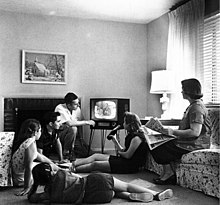座りがちなライフスタイル
この記事は英語版の対応するページを翻訳することにより充実させることができます。(2024年8月) 翻訳前に重要な指示を読むには右にある[表示]をクリックしてください。
|
座りがちなライフスタイル(すわりがちなライフスタイル、英: sedentary lifestyle)とは、体の活動性が全くない、もしくは不規則にしか活動性がない生活のことである。"sedentary lifestyle"は医学用語でもあり、日本医学会医学用語辞典[1]ではその訳として、座りがちなライフスタイル、医中誌WEB[2]ではMeSHとして身体活動量の少ない生活が登録されている[3]。

座りがちなライフスタイルの者は、英語の口語では「カウチポテト族」と呼ばれる。座りがちなライフスタイルは、発展途上国でも、先進国でも見られる。座りがちなライフスタイルとは、例えば、体を全くあるいはほとんど動かすこと無しに、1日の多くの時間を、座りながらあるいは横たわった状態で、読書をすること、テレビを見ること、ビデオゲームをすること、コンピューターを使うことなどで消費することである。このライフスタイルは、適度に身体を動かしていれば予防可能な疾患や死の原因となる。
「画面時間」とは、人が、テレビやコンピューター・モニターやモバイル機器の画面を見て費やす時間のことである。過剰な画面時間は、健康に悪い結果をもたらす [4][5][6][7]。
健康への影響
編集体の活動性を欠くことは、世界の予防可能な死亡の原因のうち、非常に重要なものの1つである[8]。
座りがちなライフスタイルは、早期死亡の原因になることがある。1日に5時間以上座ると、リスクが上がる。これは、激しい運動をすることや、BMIの値とは独立のリスク因子であることが示されている。じっとしている時間が長いほど、慢性疾患のリスクが高くなる。1日に4時間以上座る人は、1日に4時間未満しか座らない人に比べて、リスクは40%高い。しかし、週に少なくとも4時間の運動をする人は、1日に4時間未満しか座らない人と同じくらいに健康である[9][10]。
座りがちな生活で体を動かさなければ、次のような状態のリスク因子となる。
解決策
編集多くの健康・環境関係機関は自動車による移動から、安全で魅力的なウォーキングやサイクリングを促進することを目的とする「アクティブ・モビリティ」(活発な移動)の推進を解決策として採用している[24]。
「ウエルネスプログラム」では道しるべとなる具体的な目標を持つことが必要不可欠である[25]。
定期的な運動は心臓の健康を維持するためにも非常に重要であり、(友人と一緒に歩いたり、スポーツリーグでプレーするように)楽しみながら運動をするなら、より良い効果をもたらすことが期待できる[26]。
歴史
編集英語の口語で「長イスのジャガイモ」を意味する「カウチポテト族」は1970年代後半にトム・イアッチーノによって生み出され、ロバート・アームストロングとジャック・ミンゴによる「カウチポテト」を特色とした2本の漫画『Dr Spud's Etiquette for the Couch Potato』 (1982) と『The Official Couch Potato Handbook』 (1983)によって普及した[27]。
運動不足は筋萎縮、すなわち筋肉の収縮と弱体化を引き起こすことになり、これは物理的な損傷のリスクを高めてしまう。また、体力は免疫系機能と相関している[28]。体力の低下は一般的に、免疫系の機能の低下を伴う。
身体活動の利点の周知にもかかわらず、アメリカ合衆国やイギリスでは多くの大人や子どもたちは比較的座りがちな生活を送っており[29][30]、そのような利点を得られるほど十分な運動は行っていない。
2008年にアメリカで実施された「アメリカ国民健康インタビュー調査」(NHIS)によると、成人の36%が「運動不足」と見なされた[31]。成人回答者の59%が週に10分以上続ける活発な身体活動に参加していなかった[31]。
関連文献
編集- 坪田一男(著)『1日6時間座っている人は早死する!』ベストセラーズ、2013年7月9日。ISBN 978-4-584-12411-6
脚注
編集- ^ “日本医学会医学用語管理”. jams.med.or.jp. 2024年8月13日閲覧。
- ^ “医中誌Web”. login.jamas.or.jp. 2024年8月13日閲覧。
- ^ “医学中央雑誌刊行会・医学用語シソーラス 第9版(2019) 50音順リスト”. 医学中央雑誌刊行会. p. サ行38. 2024年8月14日閲覧。
- ^ Relationship between screen time and metabolic syndrome in adolescents J Public Health (2008) 30 (2): 153-160.
- ^ “Elsevier”. Ambulatorypediatrics.org. 2013年11月30日閲覧。
- ^ “Elsevier”. Jpeds.com. 2013年11月30日閲覧。
- ^ Screenieboppers and extreme screenies: the place of screen time in the time budgets of 10–13 year-old Australian children Australian and New Zealand Journal of Public Health; Volume 30, Issue 2, pages 137–142, April 2006
- ^ Lopez AD, Mathers CD, Ezzati M, Jamison DT, Murray CJ (May 2006). “Global and regional burden of disease and risk factors, 2001: systematic analysis of population health data”. Lancet 367 (9524): 1747–57. doi:10.1016/S0140-6736(06)68770-9. PMID 16731270.
- ^ smh.com.au - Sitting can lead to an early death: study, 2012-03-28
- ^ ama-assn.org - New Exercise Prescription: Don't Just Sit There: Stand Up and Move More, More Often, David W. Dunstan, PhD; Neville Owen, PhD, Arch Intern Med. 2012;172(6):500-501. doi:10.1001/archinternmed.2012.209, 2012-03-26
- ^ Solan, Matthew (2022年4月1日). “The worst habits for your brain” (英語). Harvard Health. 2022年4月16日閲覧。
- ^ a b c d e f g “Physical Activity”. World Health Organization. January 23, 2010閲覧。
- ^ “Depression and anxiety: Exercise eases symptoms”. Mayo Clinic. January 22, 2010閲覧。
- ^ a b Daniel M. Landers. “The Influence of Exercise on Mental Health”. President's Council on Physical Fitness and Sports. February 5, 2010閲覧。 “The research literature suggests that for many variables there is now ample evidence that a definite relationship exists between exercise and improved mental health. This is particularly evident in the case of a reduction of anxiety and depression.”
- ^ “Risk Factors for Cardiovascular Diseases”. United States Department of Veterans Affairs. January 22, 2010閲覧。
- ^ “Physical inactivity a leading cause of disease and disability, warns WHO”. World Health Organization. January 23, 2010閲覧。
- ^ Flicker, Leon; McCaul, Kieran A.; Hankey, Graeme J.; Jamrozik, Konrad; Brown, Wendy J.; Byles, Julie E.; Almeida, Osvaldo P. (January 27, 2010). “Body Mass Index and Survival in Men and Women Aged 70 to 75”. Journal of the American Geriatrics Society (John Wiley & Sons) 58 (2): 234–241. doi:10.1111/j.1532-5415.2009.02677.x. PMID 20370857. "Being sedentary doubled the mortality risk for women across all levels of BMI but resulted in only a 28% greater risk for men"
- ^ “Who Is At Risk for High Blood Pressure?”. National Institutes of Health. April 15, 2010閲覧。
- ^ “Obesity and Overweight for Professionals: Causes”. Centers for Disease Control and Prevention. 2010年1月5日時点のオリジナルよりアーカイブ。2010年1月19日閲覧。
- ^ a b c “Overweight and Obesity: What You Can Do”. Surgeon General of the United States. January 19, 2010閲覧。
- ^ “Exercise and Bone Health”. National Institute of Arthritis and Musculoskeletal and Skin Diseases (2009年). February 1, 2010閲覧。
- ^ “Osteoporosis — Frequently Asked Questions”. United States Department of Health and Human Services (2009年). February 1, 2010閲覧。
- ^ Natural course and prognosis of intervertebral disc diseases. International Society for the Study of the Lumbar Spine, Seattle, Washington, June 1994.
- ^ “KidsWalk-to-School: Barriers and Solutions”. Centers for Disease Control and Prevention (2008年). 2010年3月9日時点のオリジナルよりアーカイブ。2010年1月25日閲覧。
- ^ “Worksite Health Promotion”. Infinite Wellness Solutions. November 28, 2011閲覧。
- ^ “25 Tips For Reversing Heart Disease”. HealthListed.com (2014年9月7日). 2015年7月4日閲覧。
- ^ The Independent, Words:Couch Poatato
- ^ “How can I give my immune system a boost?”. National Health Service. January 24, 2010閲覧。
- ^ “Physical Activity Statistics”. Centers for Disease Control and Prevention. 2015年7月6日閲覧。
- ^ “Statistics on Obesity, Physical Activity and Diet: England, February 2009”. National Health Service. January 22, 2010閲覧。
- ^ a b Pleis, John R.; Lucas, Jacqueline W.; Ward, Brian W. (2008). “Summary Health Statistics for U.S. Adults: National Health Interview Survey”. Series Reports from the National Health Interview Survey #10. Centers for Disease Control and Prevention. pp. 11.
外部リンク
編集- Vlahos, James (2011年4月14日). “座ることは、致死的な活動か?(Is Sitting a Lethal Activity?)”. Magazine (New York Times)
- 「座りっぱなしの生活は早く老ける」(坪田一男著)日経ウーマン・オンライン
- TED education 「なぜ座ることは体に悪いか」TED Ed
- 座り過ぎが健康寿命を縮める 読売新聞
- 座りっぱなしでいると健康寿命が7年短くなる可能性がある Huffington Post 2014.12.30